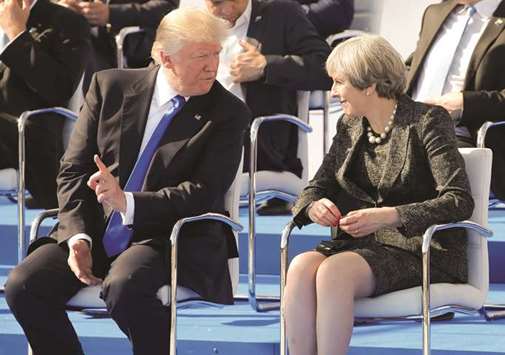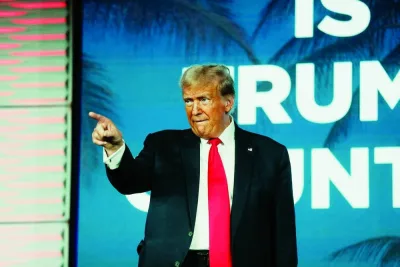Prime Minister Theresa May said she would tell US President Donald Trump that intelligence shared between their two countries had to remain secure, in a rare public show of dissatisfaction with Britain’s closest security ally.
Police are holding eight people in custody in connection with the attack on a packed concert hall, which killed 22 people.
Manchester’s Chief Constable Ian Hopkins said the arrests were significant.
“I want to reassure people that the arrests that we have made are significant, and initial searches of premises have revealed items that we believe are very important to the investigation,” he told reporters.
A source with knowledge of the investigation told Reuters the bomber, Salman Abedi, might have made the bomb himself or with some assistance from an accomplice.
That was a change from previous thinking that a bomb-maker might be at large.
“The focus is still the search for accomplices and the network but he could have made this bomb himself,” the source said.
The official threat level in Britain was raised after the attack to “critical”, its highest level, meaning a further attack could be imminent.
Troops have been deployed to free up police officers for patrols and investigations, and yesterday the British Transport Police said armed officers would patrol trains for the first time.
Hopkins said on Wednesday that Abedi was part of a network. Born in Manchester to Libyan parents, the 22-year-old had recently returned from Libya, according to interior minister Amber Rudd.
He blew himself up at the Manchester Arena indoor venue after a concert by US singer Ariana Grande, whose fan base is made up largely of children and teenagers.
The victims ranged from an eight-year-old schoolgirl to parents who had come to pick up their children.
The attack also injured 116 people, of whom 75 were admitted to hospital and 23 remain in a very serious condition, health authorities said yesterday.
Hopkins said the leaks of details of the investigation to US media, which included forensic photographs of the bomb site published by the New York Times, had been hurtful to the families of the victims.
“It is absolutely understandable the distress and upset that this caused to these families that are already suffering,” he said.
May said she would talk to Trump at a Nato summit later yesterday about the leaks.
“I will make clear to President Trump that intelligence that is shared between our law enforcement agencies must remain secure,” she said in a televised statement.
The decision to stop sharing police information with US agencies was an extraordinary step as Britain sees the United States as its closest ally on security and intelligence.
“This is until such time as we have assurances that no further unauthorised disclosures will occur,” said a counter-terrorism source, who spoke on condition of anonymity.
The BBC said later Interior Minister Rudd was now confident the leaks, which she had described as irritating, would now stop.
The most senior US diplomat in Britain condemned the leaks as “reprehensible” and said the US government would take action to identify those responsible and stop them.
British authorities did not say that the investigation had in fact been compromised by the leaks.
Many European cities, including Paris, Berlin and Brussels, have suffered attacks in the last two years, underlining the importance of confidential intelligence cooperation.
Britain routinely shares intelligence with the United States bilaterally, and also as part of the “Five Eyes” network which also includes Australia, Canada and New Zealand.
Trump was widely criticised this month after it emerged he had discussed sensitive Syria-related intelligence, originating from an ally, with Russian officials at a White House meeting.
May said at the time Britain would continue to share information with Washington.
Queen Elizabeth visited the Royal Manchester Children’s Hospital, where some of the casualties have been treated.
A minute’s silence was observed in honour of the victims at a square in central Manchester.
The city’s two giant soccer clubs, Manchester United and Manchester City, laid aside their fierce rivalry to jointly donate $1.3mn to an emergency fund set up to support families affected by the attack.
The bombing, targeting as it did children and teenagers, has caused revulsion across the world.
British media have reported that one of the eight people under arrest is Abedi’s brother but police have not confirmed that.
Abedi’s father and younger brother were arrested in Tripoli in Libya. The pictures published by the New York Times included remains of the bomb and of the rucksack carried by the suicide bomber, and showed blood stains amid the wreckage.
“I think it’s pretty disgusting,” said Scott Lightfoot, a Manchester resident, speaking outside a train station in the city. He criticised media for publishing such material.
“Who’s leaking it? Where’s it coming from? This is British intelligence at the end of the day, people shouldn’t be finding out about this.”
The Financial Times reported that such images are available across a restricted-access encrypted special international database used by government ordnance and explosives experts in about 20 countries allied with Britain. It said the database was built around a longstanding US-British system.
US channel ABC News reported that police had found a kind of bomb-making workshop in Abedi’s home and he had apparently stockpiled enough chemicals to make additional bombs.
Armed police will patrol trains across Britain for the first time, British Transport Police said.
Members of the armed forces have been deployed at key sites to boost security since the threat was raised to its highest level for the first time in 10 years.
Armed officers have been regularly patrolling the London Underground since December last year, but this will be the first time they have will have patrolled on board train services elsewhere in the country, the police said.
“By having firearms officers on board trains we’re ensuring that trains remain as safe as possible for passengers. Our patrols will be highly visible and passengers should feel comforted by their presence,” British Transport Police Chief Constable Paul Crowther said in a statement.
Crowther said the move was not due to any specific intelligence related to trains but was part of the national plan to deal with the continuing threat.



